10 Facts About Awful Mosquitos
10 Facts About Awful Mosquitos
1. Different Types of Mosquitos
There are approximately 3,500 different species of mosquitoes in the world. In the United States, the three most common species of mosquito that bite humans are the Aedes, Anopheles, and Culex. 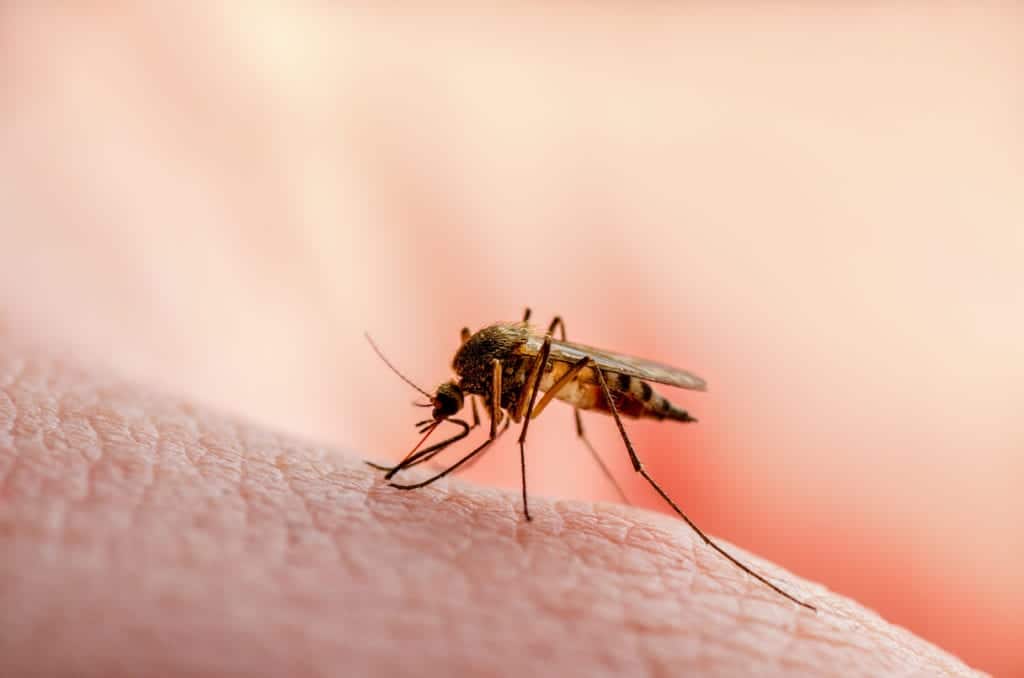
2. Males VS. Females
Contrary to popular belief, not all mosquitos suck blood. Of that vast number of species that exist, only some of them target humans. Also, out of the species that do target humans, it’s actually only the females that seek out sanguine meals, while the males tend to dine exclusively on nectar from flowers. The males are also significantly smaller than their female counterparts and have furry antennas extending forward from their heads. On average, female mosquitos live for a month or two while males only last for about two weeks after hatching. Due to their short life spans, they don’t typically want to travel too far away from their breeding grounds, however more recent evidence has revealed that mosquitos actually have the ability to travel hundreds of miles and breed after venturing so far from home.
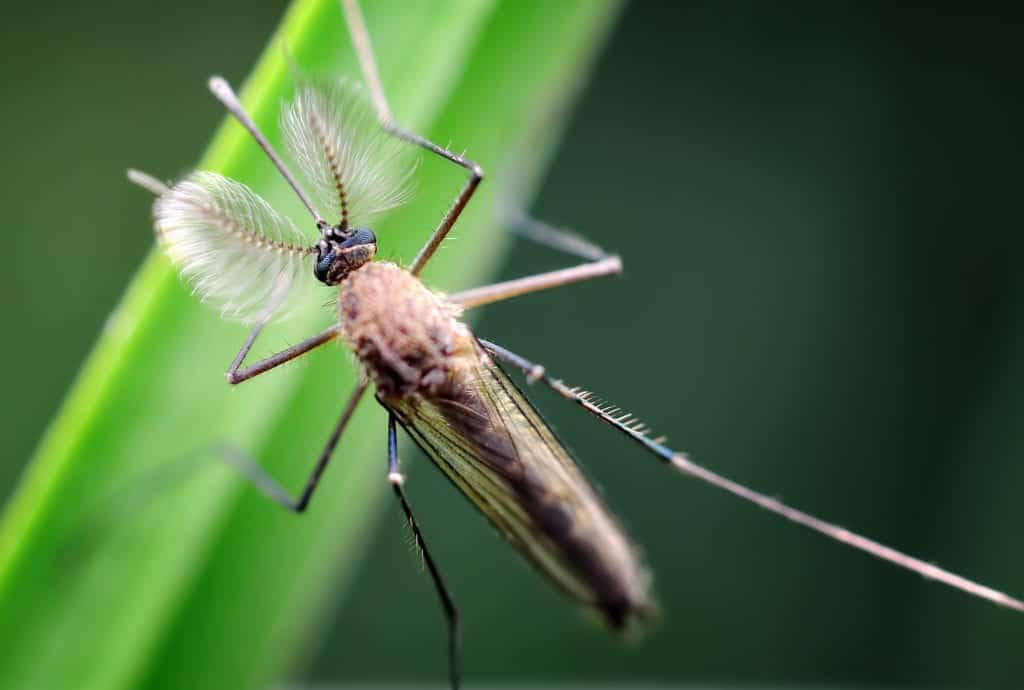
The male mosquito
3. Mosquito Bites
Mosquitos bite people using a small straw-shaped mouth appendage known as a proboscis. This appendage is actually made up of six sharp needle-like components called stylets that pierce the skin of their prey. When biting, they inject their saliva into the wound. This saliva acts as a numbing agent to mask their presence, as well as an anticoagulant to improve blood flow and prevent clots while they are indulging in their sanguine feast. In addition to acting as an anti-coagulant and anesthetic, the saliva contains proteins that trigger a fairly mild immune response in humans. This response involves the immune system releasing a histamine, which helps white blood cells access the affected area and leads to the inflammation. The histamine also sends a signal to the nerves around the bite and it is this very signal, along with the swelling, that causes the infamous itchy sensation of mosquito bites. 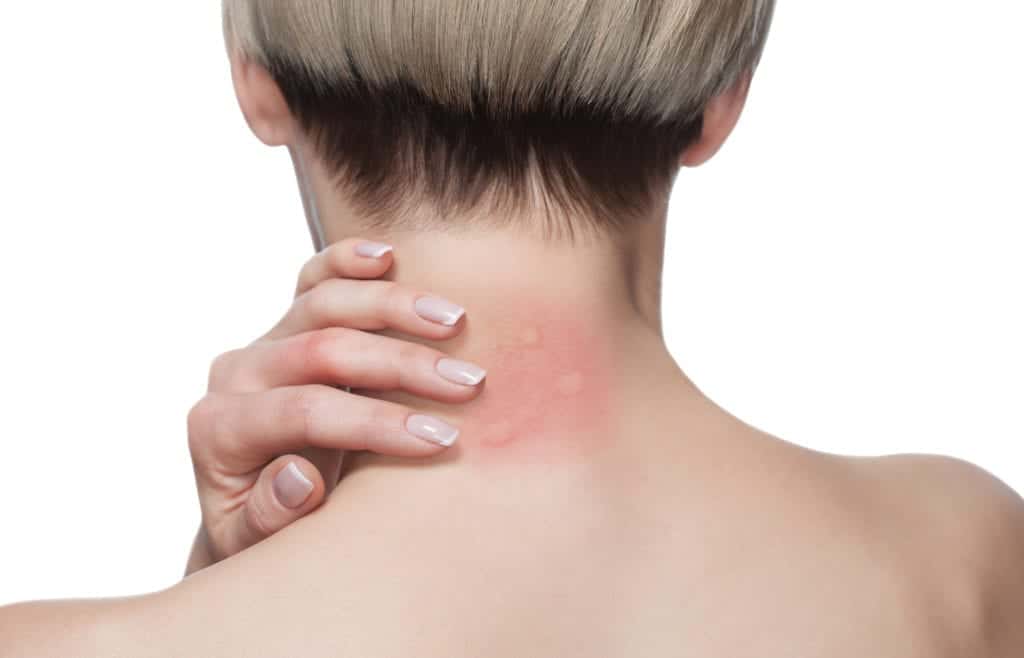
4. Reproduction
As stated above, male mosquitos uniquely have a pair of furry antennas. These antennas are actually used to pick up on the infamous buzzing that females make as they fly, allowing them to hone-in on mates. Once a female has mated, she seeks out blood meals. This consumption of blood actually has little to do with a simple diet preference and everything to do with procreation. In order to produce their eggs, females require a high dose of protein and iron, which are both found in high concentrations in human blood. Unfortunately, these insects are prolific breeders that are able to produce between 50 – 500 offspring in a single brood and up to 10 broods in a lifetime. 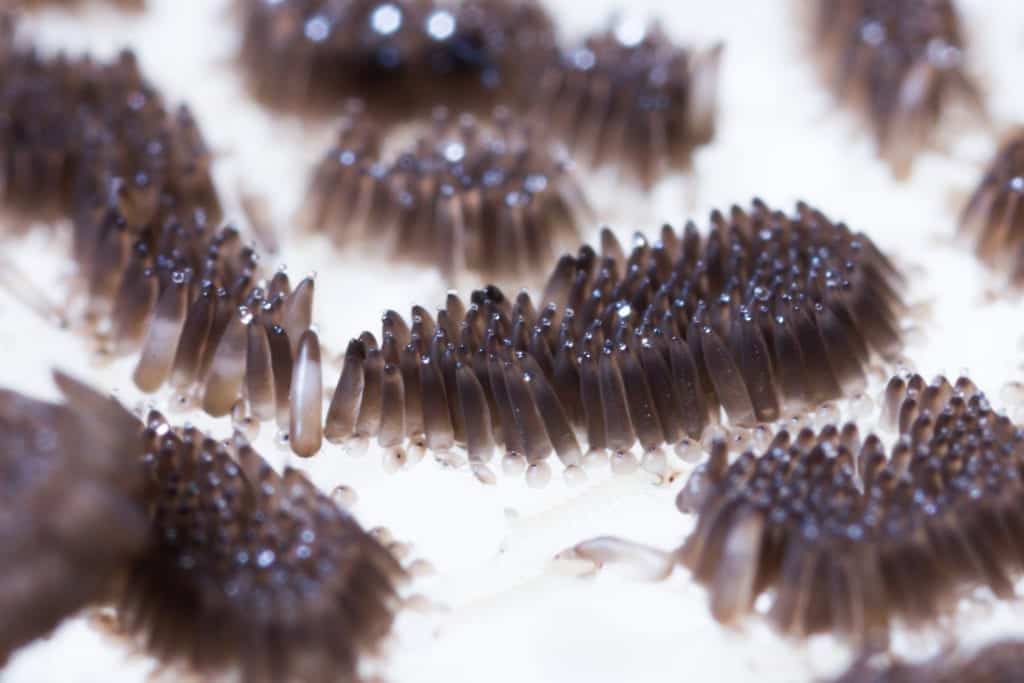
5. How Mosquitos Find Us
Mosquitos are basically programmed to find hosts for their blood meals. For example, they are attracted to our exhalation of carbon dioxide and actually have three different sensors for seeking sources of CO2. These sensors are cells called GR1, GR2, and GR3. In genetically modified mosquitos that were no longer able to use their GR3, there was a notable difference in their ability to detect targets, especially from a distance. Mosquitos are also able to detect and are attracted to:
- Lactic acid from sweat
- Body Heat
- Dark Colors
- Uric Acid
- Estrogen

6. Mosquito-Transmitted Diseases
These insects are nasty invertebrates and vectors of disease. Many of the diseases that mosquitos carry are some of which are extremely detrimental, and even potentially deadly to humans. IN fact, each year, mosquito-transmitted diseases account for several million deaths worldwide, making it one of the deadliest creatures on Earth. Most infamously, mosquitos spread Malaria, West Nile Virus, Zika Virus, Chikungunya Virus, Dengue, and Yellow Fever. 
7. The History of Mosquitos
Much like in Michael Crichton’s fictional story, Jurassic Park, prehistoric mosquitos have actually been discovered preserved in substances such as amber, the oldest dating back to roughly over 45 million years ago. Following such discoveries, teams of scientists examined these amber-preserved insects. Entomologist spouses Roberta and George Poinar were even able to extract preserved contents within the gut of these insects which managed to provide evidence regarding the potential health of dinosaurs millions of years ago. 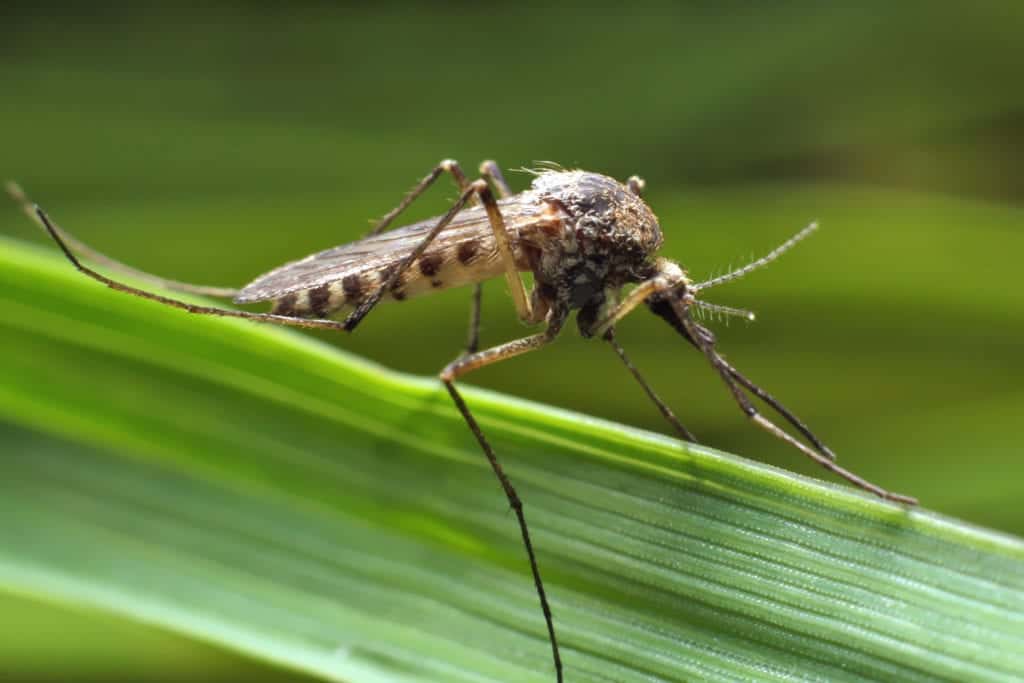
8. Keeping them at Bay
Shockingly, mosquitos can be conditioned to leave you alone. Mosquitos can recognize the scents of different people and can associate these scents with swatting. When swatted at, mosquitos may begin adjusting their behavior and avoid that particular person in order to stay safe and prevent their own squishing. While these findings from a scientific experiment revealed that swatting may help keep away individual mosquitos, it in no way indicates that their friends will stay away as well. This explains why it often seems like swatting and slapping doesn’t help – you may think it’s the same mosquito coming back while in fact it may be a number of different little bloodsuckers. As such, it’s important to wear mosquito repellants, long clothing (when possible), and try to avoid areas that are highly populated with mosquitos.

9. The Debate Behind Eliminating Mosquitos
There is a debate within scientific circles as to whether or not the disappearance of all mosquitos would be detrimental to our ecosystems. Some scientists theorize that there would not be large negative effects and that the world would actually adjust to the lack of mosquitos rather easily. On the flipside, other scientists argue the stance that certain species of mosquitos do actually play very important roles within their respective ecosystems and food chains so, if they were to spontaneously disappear, it could potentially harm their local plants, animals, and fellow insects. 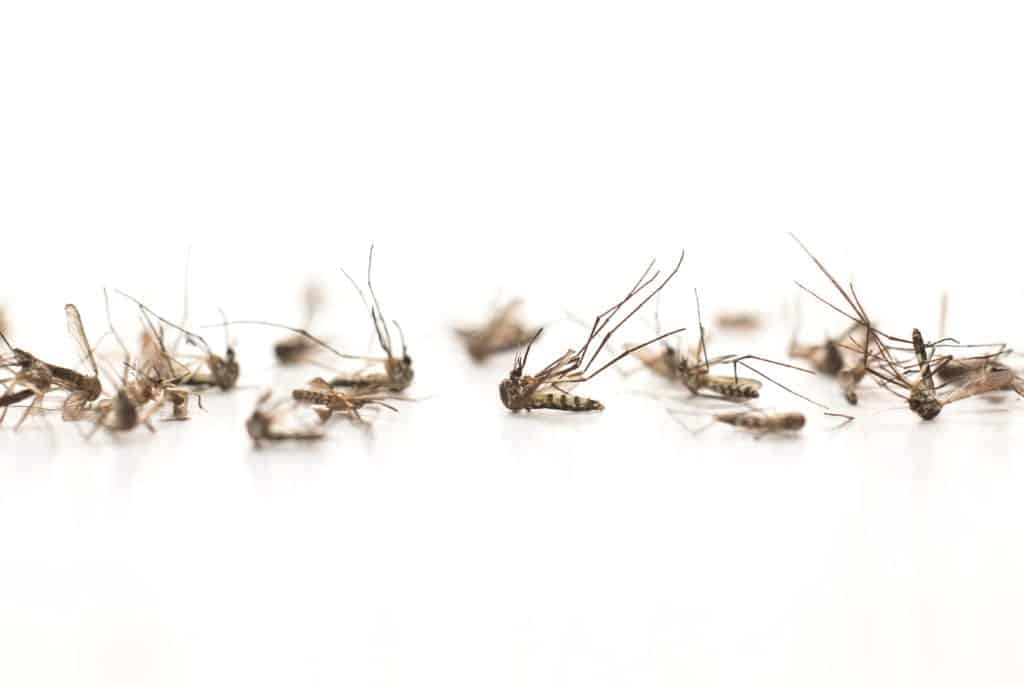
10. Eliminating the Danger Behind Mosquitos
While we may not be able to eliminate mosquitos altogether and it is difficult to fully keep them at bay, scientists are focusing on the possibility of eliminating the dangers of mosquitos instead. The team of scientists introduced modified genes into Anopheles mosquitos that actually attacked the parasites inside the mosquitos that are responsible for causing malaria, rendering them unable to pass the disease to humans. Most impressively, this modified gene was specifically designed to become genetically significant within the species, meaning it should pass on to future generations with a 99.5% accuracy rate. Other experiments are taking place tackling different species and diseases in a similar fashion. If this is successful, we may one day truly eradicate the danger of mosquitos. Until then however, it’s important to protect yourself and your family. With regular mosquito abatement treatments at Pointe, you can stay far safer this summer. Call us today for more information. 
Citations
Burgess, L. and Seladi-Schulman, J. Ph.D. (2018) Why do mosquito bites itch? Causes and treatment, Medical News Today. MediLexicon International. Available at: https://www.medicalnewstoday.com/articles/320979#overview (Accessed: January 19, 2021). Guesgen, M. (2019) 5 Things That Make You a Mosquito Magnet, YouTube. SciShow. Available at: https://www.youtube.com/watch?v=j6MrN9o0BfA (Accessed: August 2020). Hill, C. and MacDonald, J. (2008) Purdue University. The College of Agriculture: Entomology. Available at: https://extension.entm.purdue.edu/publichealth/insects/mosquito.html#top (Accessed: April 2020). How Mosquitos Got Their Taste for Human Blood – What it Means for the Future (2020) SciTech Daily. Cell Press. Available at: https://scitechdaily.com/how-mosquitoes-got-their-taste-for-human-blood-what-it-means-for-the-future/ (Accessed: September 2020). Hughes, V. (2008) Did the Dinosaurs Bug Out?, The Smithsonian Magazine. The Smithsonian Institute. Available at: https://www.smithsonianmag.com/science-nature/did-the-dinosaurs-bug-out-180940839/ (Accessed: October 2020). Keubeck, E. (2012) Are You a Mosquito Magnet?, WebMD. Available at: https://www.webmd.com/allergies/features/are-you-mosquito-magnet#1 (Accessed: June 2020). Mosquitos (2019) National Geographic. National Geographic Partners. Available at: https://www.nationalgeographic.com/animals/invertebrates/group/mosquitos/ (Accessed: April 2020). Mosquito Bites (2020) Mayo Clinic. Mayo Foundation for Medical Education and Research. Available at: https://www.mayoclinic.org/diseases-conditions/mosquito-bites/symptoms-causes/syc-20375310 (Accessed: January 19, 2021). Mosquito-Borne Diseases (2016) Centers for Disease Control and Prevention. National Institute for Occupational Safety and Health. Available at: https://www.cdc.gov/niosh/topics/outdoor/mosquito-borne/default.html (Accessed: April 2020). Poinar, R. and Poinar, G. (2008) What Bugged the Dinosaurs? – Insects Disease, and Death in the Cretaceous. Princeton University Press. Pointer, K. and Sullivan, D. Ph.D. (2019) Why Mosquito Bites Itch and How to Stop Them, Healthline. Healthline Media. Available at: https://www.healthline.com/health/why-mosquito-bites-itch#outlook (Accessed: January 2021). Ricciuti, E. (2020) Study Shows Mosquitos Can Still Spread Malaria After Long-Distance Flights, Entomology Today. The Entomological Society of America. Available at: https://entomologytoday.org/2020/08/12/anopheles-mosquitoes-malaria-long-distance-flights/ (Accessed: December 2020). Riley, C. (2016) What If We Killed All the Mosquitos?, YouTube. SciShow. Available at: https://www.yotuube.com/watch?v=e0NT9i4Qnak (Accessed: June 2020). Saplakoglu, Y. (2018) Here’s Why Mosquito Bites Itch for Such a Long Time, LiveScience. Available at: https://www.livescience.com/62601-why-mosquito-bites-itch.html (Accessed: January 19, 2021). What Happens to Your Body When a Mosquito Bites You (2019) YouTube. Brightside. Available at: https://www.youtube.com/watch?v=91X8RcJBFwA (Accessed: July 2020).
Request a Free Quote Today
(We do not share your data with anybody, and only use it for its intended purpose)
